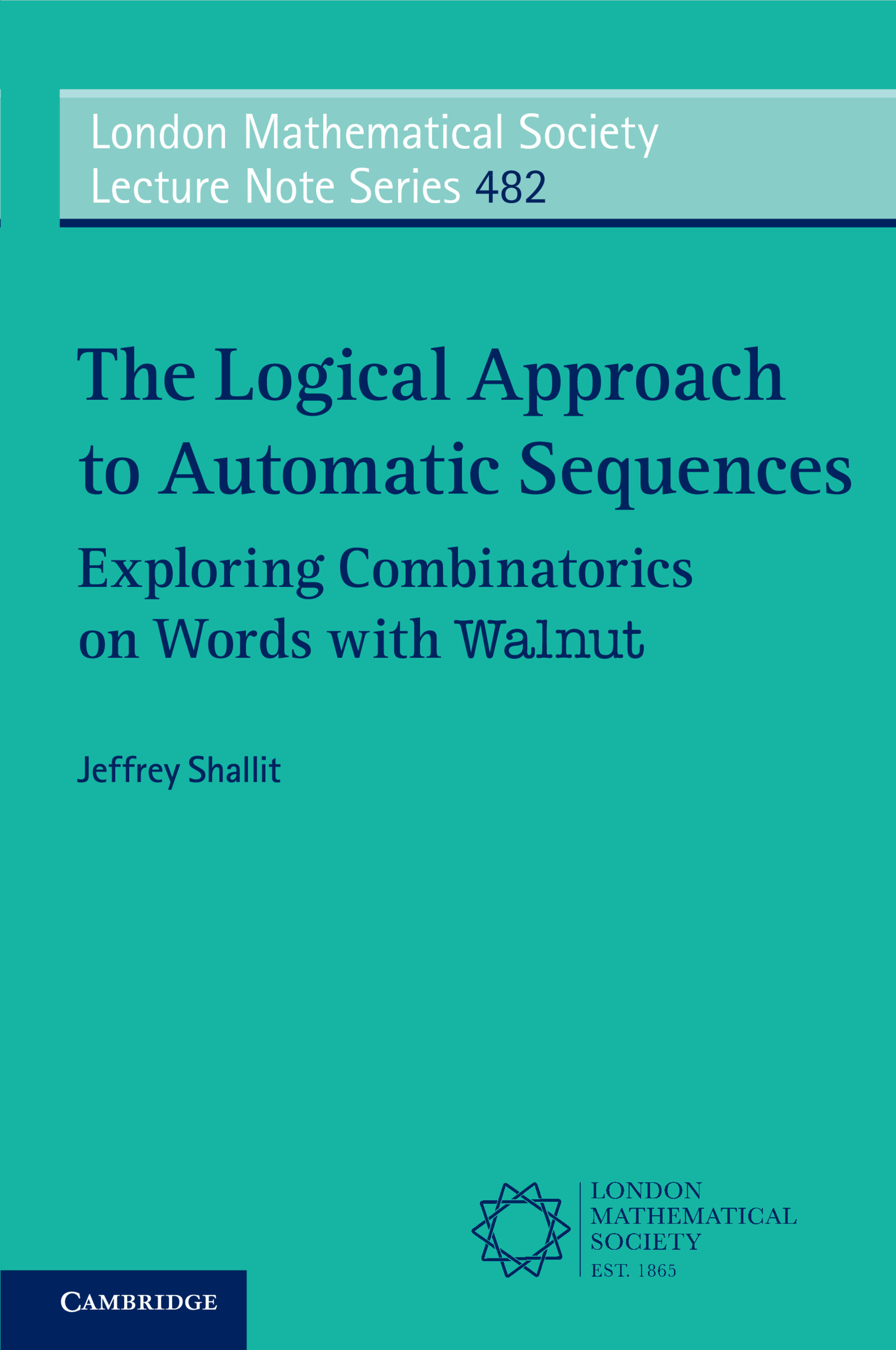The Logical Approach To Automatic Sequences:
Exploring Combinatorics on Words with Walnut
In this book, Jeffrey Shallit gives combinatorics on words enthusiasts access to new and exciting tools to compute examples and test conjectures. Far from a mere user's manual, the text fully introduces the reader to the interactions of logic and words, proving basic theorems like the decidability of Presburger's arithmetic. It will be of great use to students and researchers, as well as the source of many future developments.
Dominique Perrin - Université Gustave Eiffel
This book focuses on a decision procedure, which is rather easy to implement as a computer program and allows one to prove many results, classical and new, in combinatorics on words. It addresses decision problems and enumeration problems on sequences that are expressible in first-order logic. The reader will appreciate the style, which is relaxed and pleasant to read, and the numerous examples and exercises. This book is a useful complement to the previous monograph, Automatic Sequences, co-authored by Shallit and Allouche.
Yann Bugeaud - University of Strasbourg
This is a marvelous book with a very fresh approach to the decidability and structural analysis of combinatorics on words. It combines three different mathematical research topics: first-order logic, automatic sequences, and combinatorics on words. More precisely, it interprets infinite morphic words as automatic sequences via k-automata and expresses properties (of words) in first-order logic. Due to the decidability of such logic, decision results and structural properties of combinatorics on words are established. A crucial role in this approach is to employ a powerful software package called Walnut. The author illustrates the power of his approach by giving a huge number of results obtained by this method. Not only are old and new results proved, but even some errors in previous ones are corrected. Anybody interested in, or curious about, this topic
should be enthusiastic about this masterpiece.
Juhani Karhumäki - University of Turku (Emeritus)
[Walnut] is an elegant and powerful tool that can be used with great effect in the analysis of morphic sequences...
We encourage the reader to check out the new and highly entertaining textbook for many more examples of the power of Walnut.
Robbert Fokkink, Gerard Francis Ortega, and Dan Rust,
Corner The Empress,
Arxiv preprint, 2022.
Here's a review by William Gasarch at U. Maryland; it appeared in SIACT News
55 (3) (September 2024), 6-10.
Here's a review in Zentralbatt
by Štěpán Holub.
- ISBN 9781108775267 (electronic)
ISBN-10: 1108745245
ISBN-13: 978-1108745246
- See the Cambridge University Press web site for the book
- You can buy it from amazon.co.uk
here.
- You can buy it from amazon.ca
here.
- You can buy it from amazon.com
here.
- You can see a little of it
here on google books.
Walnut Source Code
I will make available the Walnut source code in the book, so you can
just copy and paste it in directly to Walnut.
Corrigenda
Page 20: Definition of Delannoy numbers needs a square on the binomial.
(Robbert Fokkink).
Page 35: The indexing of the Pell representations in
Section 3.4 were messed up.
In Theorem 3.4.1 the representation should have been
written as Σ1 ≤ i ≤ t
ai Pi. (José L. Ramírez)
Page 43: In the statement of Theorem 3.5.17, the "f" should be
f in boldface. (José L. Ramírez)
Page 55: Line 10, replace F with Fi.
(Lucas Mol)
Page 59: In the algorithm Semigroup Trick, the line
τ(s) = tw should read τ(s) = sw. (Pierre Popoli)
Page 69: In line 15, change (n)R to
(n)kR.
In line -7, the τ should be τ'. (José L. Ramírez)
Page 70: In line 2, the τ should be τ'. (José L. Ramírez)
Page 85: In the statement of Theorem 6.3.2, the "P" in the last
sentence should be \varphi;. (Jonathan Allin)
Page 109: Exercise 41, section 7.11: Part (c), second term should be
F_3, not F_4. (Robbert Fokkink).
Page 119: Section 8.1.9: the Walnut code for "rsrun0" is wrong; it should be
def rsrun0 "n>=1 & (At t<n => RS[i+t]=@0) & RS[i+n]!=@0 & (i=0|RS[i-1]!=@0)":
Page 125: Line 4, delete the word "corresponding".
(Lucas Mol)
Page 136: Not exactly a corrigendum---more of an addendum. Part of
Theorem 8.5.4 can be found in T. Downarowicz, Reading along arithmetic
progressions, Colloq. Math. 80 (1999), 293-296.
Page 156: In line 11, replace "0 except y" with "except y". In
line 18, replace "0,3,4,5,9" with "3,4,5,7,9". (Manon
Stipulanti)
Page 166: In the definition of tmbord, the letter
m should be replaced by j.
Page 167: The definition of fibbord has an unnecessary
variable t. It should read
def fibbord "?msd_fib m>=1 & m<n & $ffactoreq(i,(i+n)-m,m)":
(Manon Stipulanti)
Page 174:
The definition of tmbord has an unnecessary
variable t. It should read
def tmbord "m>=1 & m<n & $tmfactoreq(i,(i+n)-m,m)":
(Manon Stipulanti)
The definition of pfbord has an unnecessary
variable t. It should read
def pfbord "m>=1 & m<n & $pffactoreq(i,(i+n)-m,m)":
(Manon Stipulanti)
Page 233: Open Question 9.11.9 has now been solved, by the
preprint at https://arxiv.org/abs/2301.11473.
